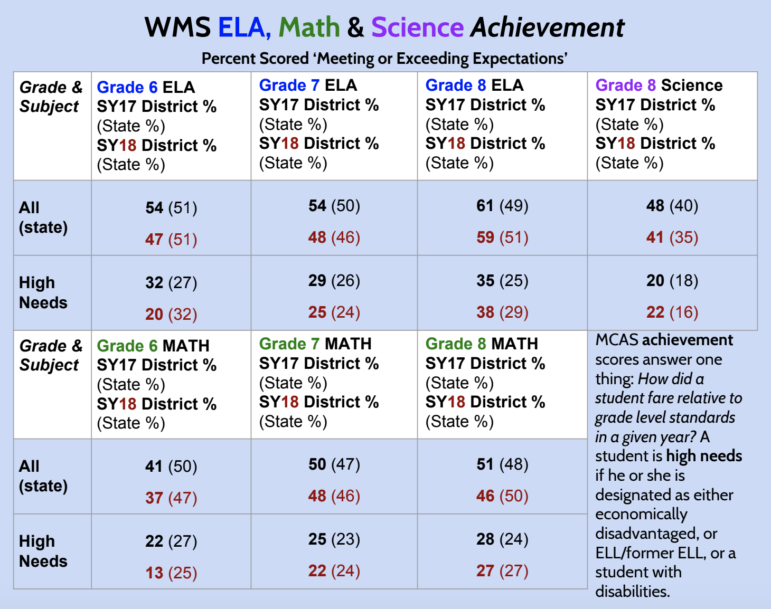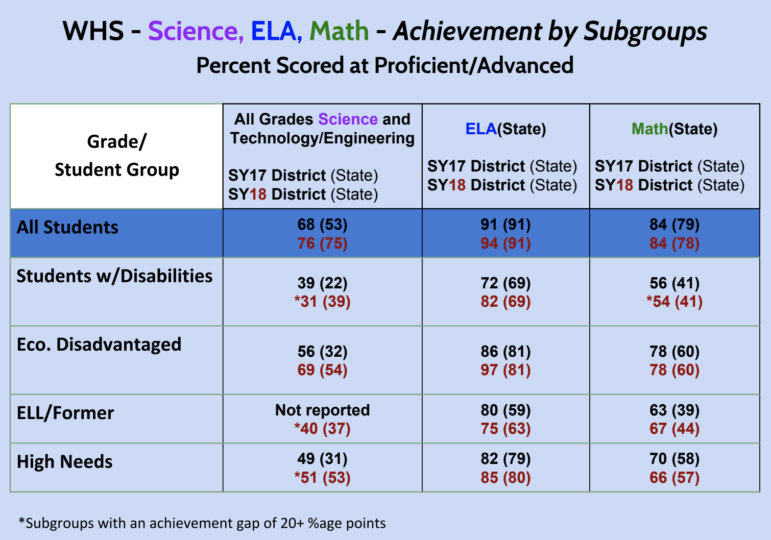
The MCAS scores at Watertown Middle School and Watertown High School showed both improvements and drops from prior years, as well as compared to the state average. The School Committee heard the report last week, and members were interested in what is being done to improve Watertown’s scores.
Interpreting the scores is not as easy as past years, said Theresa McGuinness, Assistant Superintendent of Teaching, Learning and Assessment, because many students took the new version of the MCAS test last year, while others took the old one.

At Watertown Middle School, the scores dropped in English Language Arts (ELA) in sixth, seventh and eighth grades, but remained ahead of state average in seventh and eighth grade, said Watertown Middle School principal Donna Martin.
In math, the WMS scores were down from 2017. They were above the state average in seventh grade, with a score of 48, but they were below the state average in sixth and eighth grade, including 10 points below the average in sixth grade.
The eighth grade science MCAS scores were down, but well above the state average, Martin said.
School Committee member Kendra Foley said while keeping near the state average is good, she wants to see the district striving for more.
“The comparison to the state is not the goal,” Foley said. “We should be well above it at all times.”
Foley added the level of support available to teachers to get improvements and also to make sure teachers are pushing students to do their best, because some do not have the self-motivation.
Martin said teachers are using the MCAS test results, as well as, the i-Ready assessment program.
“We look at what questions they do well on or what questions they struggle on and make sure what we are doing is working,” Martin said.
McGuiness said the district has 100 licenses with i-Ready, an assessment tool used in conjunction with MCAS, which can target particular students who are struggling on the test and will set up groups of students so teachers can target students having trouble in similar areas.

On the 10th grade ELA test, Watertown High School students have stayed in line or above the state average, said WHS Principal Shirley Lundberg. In 2018, the score was 94 percent, three points above the state average.
In math, WHS students have consistently scored 5 percentage points or more above the state average, Lundberg said. In 2018, Watertown’s score 84 percent, six points above the state average.
The science scores is a mixed bag, in part because students do not all take the same test at the same time. The students who take physics as freshman take the MCAS as a ninth grader, and those who take biology — a two year course — take it in the 10th grade. Some students who transfer into the district who have taken chemistry take the chemistry exam.
Along with the test scores, schools are rated on areas such as attendance, rate of taking high level courses, graduation rate, and number of students taking more than four years to complete high school (called extended engagement).
WHS only received one point out of four on the extended engagement category in the High School Completion section of the state’s accountability report. Lundberg said the state seems to be looking at the special needs program for students ages 18 to 22.
“We suspect it is the 18 to 22 program, is why we are only one out of four,” Lundberg said. “It is a good program that is being counted against us.”
Teachers at the high school are also using i-Ready to see what skills students do well on and where they need work, but they do not have the licenses as they do at the middle school.
They are also making sure that students cover all the subjects that are covered on the MCAS by the time they take the test, said Maureen Reagan, ELA curriculum coordinator for grades 6-12. The test is given in April for high schoolers, for instance, so teachers need to make sure they cover poetry before then.
Dan Wulf, math curriculum coordinator for grades 6-12, said that the district also is bringing in other curriculum, or textbooks, to make sure students cover all the areas. Some areas on the MCAS are not focused on in the books used by Watertown, he said, so they have looked at what other districts use to fortify their lessons.
See the entire MCAS presentation by clicking here.
It’s unfortunate that MCAS does little to improve student achievement, crushing creativity and reinforcing memorization based “learning”. Teachers and schools overanalyze the results to feel good about themselves.